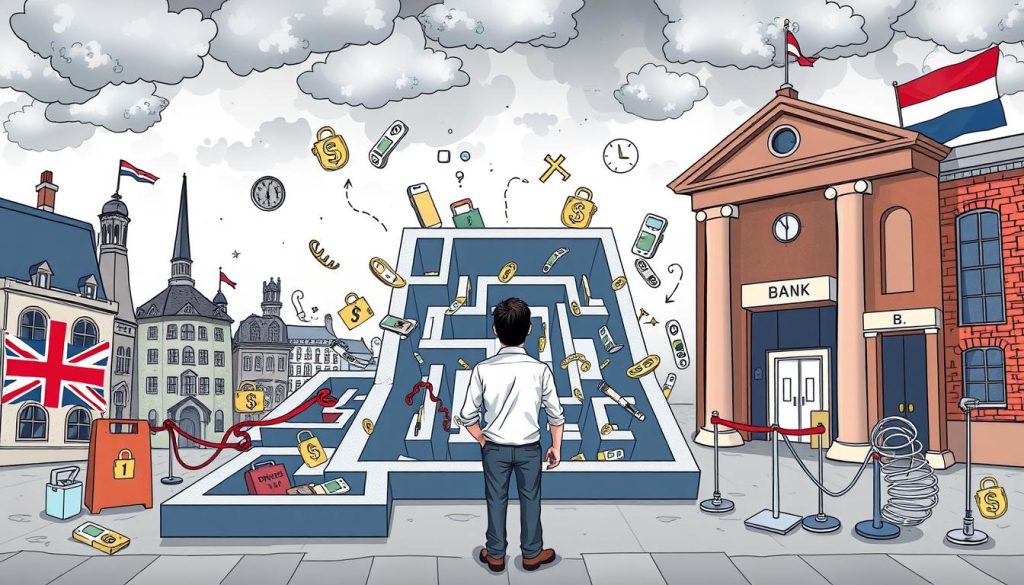For UK businesses, understanding Dutch business banking is key. The Netherlands has a strong financial system and many banking choices. Yet, it also brings its own set of challenges and opportunities.
Getting the right banking insights is essential. It helps with managing cross-border deals and fitting into the local financial scene. This introduction will guide UK companies through the complexities of Dutch business banking.
The Importance of Business Banking in the Netherlands

Business banking is key in the Netherlands, especially for UK businesses wanting to grow. The Netherlands’ location and banking system make it a strong financial base. This helps UK companies succeed globally.
Dutch banks have many financial products for businesses. They offer flexible loans, trade finance, and good currency exchange services. Their knowledge of EU rules is also a big plus for UK businesses aiming for the European market.
In short, knowing how vital business banking is in the Netherlands is crucial for UK businesses looking to expand. Dutch banks’ unique benefits help with smooth transactions and long-term success in the area.
Understanding the Dutch Banking System

The Dutch banking system is known for its strong rules and focus on keeping finances stable. It meets the needs of both individuals and businesses. This is thanks to a mix of commercial banks, cooperative banks, and local savings banks.
The De Nederlandsche Bank is the main rule-maker. It makes sure banks follow strict rules to stay safe. The European Central Bank also plays a big role, especially with money policies and interest rates.
Thanks to strict rules, the banking system is very reliable. Banks go through regular checks to keep up high standards. This helps reduce risks and builds trust with customers. Such strict rules make the Dutch banking system very trustworthy.
Business Banking in the Netherlands: A Comprehensive Overview

Business banking in the Netherlands has a lot to offer. It caters to all kinds of companies, from small startups to big corporations. You can find everything from Dutch business accounts to loans and investment services.
Many banks in the Netherlands meet different business needs. This means you can pick the best option for your company. Some key services include:
- Comprehensive business banking solutions that include features like online banking platforms for ease of management.
- Various types of Dutch business accounts designed to accommodate differing transaction volumes and cash flow needs.
- Diverse lending options, ensuring businesses can secure the necessary funding for growth and operations.
- Investment services that present opportunities for businesses to grow their capital strategically.
- Payment solutions that facilitate domestic and international transactions efficiently.
This detailed approach helps every business, big or small, find the right financial tools. It’s all about helping them succeed in the Netherlands’ competitive market.
Types of Banking Options for UK Enterprises

UK firms in Netherlands have many banking options. Traditional banks offer loans, credit, and financial advice. They are known for trust and reliability.
Fintech solutions are also popular. They provide easy online banking and lower fees. This makes them a good choice for those who value quick service and technology.
Choosing between local and international banks is important. Local banks know the area well, while international banks offer global services. It’s key to compare these options to find the best fit for your business.
Knowing about banking options helps UK firms in Netherlands. It lets them improve their banking, save money, and work more efficiently.
Features of Business Bank Accounts in the Netherlands

It’s important for UK businesses to know about the features of business bank accounts in the Netherlands. Dutch banks have services to help businesses manage their money well. They offer tools for better account management, making it easier for business owners to keep track and stay efficient.
Account Management Tools
Effective account management tools are key in the Netherlands. Businesses can enjoy:
- Online banking platforms for real-time transaction tracking.
- Mobile apps for easy access to account info and functions.
- Tools for budgeting and analytics to understand financial health.
- Automated transaction categorisation for easier bookkeeping.
Transaction Fees and Costs
When picking a business bank account, knowing the fees in the Netherlands is crucial. Different banks charge differently. Important things to look at include:
- Monthly maintenance fees, which vary by account type.
- Charges for incoming and outgoing transfers, especially international ones.
- Costs for overdraft facilities and other credit options.
- Clear billing practices for better budgeting.
Regulatory Framework Governing Business Banking

The rules for business banking in the Netherlands are key to a safe and smooth financial scene. For foreign companies, following Dutch financial rules is crucial. Knowing these rules helps UK businesses deal with the Dutch banking world’s challenges.
Key Regulations for Foreign Businesses
Foreign companies must follow important rules when banking in the Netherlands. Key rules include:
- The Anti-Money Laundering (AML) Act, which makes banks fight money laundering.
- The Know Your Customer (KYC) policy, which checks clients’ identities to stop fraud.
- The Markets in Financial Instruments Directive (MiFID), which ensures clear dealings and protects investors.
Compliance Requirements
To meet Dutch banking rules, foreign companies must set up strong systems. These systems usually involve:
- Regular reports to the Authority for the Financial Markets (AFM) to show they follow the rules.
- Putting in place internal checks to meet AML and KYC rules.
- Training staff on Dutch financial laws regularly to keep everyone up to date.
The Process of Opening a Business Bank Account

Opening a business bank account in the Netherlands is a structured process. It requires specific steps and documents. Knowing what documents you need is key to a smooth application.
Required Documentation
To open a business bank account, you need to gather several important documents. The main items include:
- Proof of identity (passport or national ID)
- Business registration certificate from the Dutch Chamber of Commerce
- Financial statements to show the business’s financial health
- Proof of address for both the business and individual signatories
- Details about the company’s structure, including owners and partners
Having these documents ready will make the account opening process easier. It helps avoid delays.
Timeline for Account Setup
The time it takes to set up an account varies. It depends on the bank and how complete your documents are. Generally, it can take from a few days to weeks.
- Bank processing speed and assessment protocols
- Completeness of the provided required documents
- Complexity of the business structure
Planning for potential delays and ensuring all documents are ready can shorten the waiting time. This is important when opening a business bank account.
Choosing the Right Bank for Your Business Needs

Finding a bank that fits your business is key. The Netherlands offers many bank services for businesses. These can greatly affect how well your business does. So, it’s important to compare banks carefully to find the right one for you.
When looking at potential banks, think about these important points:
- Services Offered: Check if the bank has services that match your business needs. This includes things like loans, payment systems, and investment advice.
- Fees and Charges: Know the costs for different services. Clear fees help avoid surprises and help you stick to your budget.
- Customer Service: Good customer support is essential. Look into how well the bank responds, especially for international business.
- Technological Innovations: Modern banking tech, like mobile apps and online accounts, can make managing money easier and faster.
Using comparison charts can help show the differences between banks. This makes it easier to choose the right bank for your business. By considering these points, you can make a smart choice and build a strong partnership with your bank.
Digital Banking Solutions in the Netherlands

Businesses in the Netherlands are looking for ways to work more efficiently. Digital banking solutions are becoming very popular. Fintech companies are bringing new ideas to the table, making financial management easier for businesses.
These fintech firms offer services that are custom-made for companies. They use the latest technology to help businesses work better.
Innovative Fintech Options
Fintech companies in the Netherlands are leading the way with new banking solutions. They offer:
- Advanced data analytics for better decision-making
- Integrated payment solutions for smooth transactions
- User-friendly interfaces that make banking easier
With more fintech companies around, businesses have a wide range of services to choose from. This makes banking better for them. It’s a big step up from old banking ways, meeting today’s business needs.
Mobile Banking Advantages
Mobile banking has changed how businesses handle their money. The main benefits are:
- Real-time transaction processing for quick updates
- Access from anywhere, great for remote work
- Easy account management through mobile apps
Mobile banking makes everyday tasks easier for businesses. It lets them focus on growing. As more companies use digital banking, they see how it helps them succeed.
International Transactions and Currency Exchange

UK businesses dealing with international banking face the challenge of currency exchange. It’s vital to understand the local market in the Netherlands for good financial planning. Currency exchange rates change often, which can affect the cost of payments across borders.
Choosing the right bank is key for managing international transactions. Banks have different fees and exchange rates. By comparing these, businesses can find the best deals. It’s important to know a few things:
- Exchange rate spreads can greatly affect costs.
- Fees for cross-border payments include transfer and conversion charges.
- Going with a bank known for international services can make transactions safer.
The Euro’s importance in international dealings should not be overlooked. The Euro’s stability against other currencies can give UK businesses good exchange rates. Keeping up with market trends helps reduce costs in currency exchange and cross-border payments.
Challenges Faced by UK Businesses in Dutch Banking

UK businesses in the Netherlands face many challenges in banking. These can make their work harder and slow down money moves. It’s key to know the banking barriers to do well in the Dutch market. Issues include complex rules, different banking ways, and red tape when opening or managing accounts.
Potential Barriers and Solutions
The banking hurdles for UK firms can show up in many ways:
- Regulatory Compliance: Dutch banking rules can be tough to get through. Firms must follow local and EU laws, leading to confusion and delays.
- Bureaucratic Delays: Long waits for account setup and loans can block quick access to money services.
- Banking Culture Differences: UK and Dutch banks have different ways of talking and doing things. This can cause misunderstandings or unmet needs.
To beat these problems, UK firms in the Netherlands should try these smart moves:
- Get help from local legal and finance experts to follow Dutch laws and rules.
- Keep talking to bank staff to clear up any confusion or needs.
- Use tech to make banking easier, like online account tools.
Customer Service Standards in Dutch Banks

Customer service in banking is key for clients, especially for those outside the country. Dutch banks aim to offer top-notch service. They use many ways to help, making it easy for businesses to get support.
They focus on making it easy to get help and improve communication. This is important for UK companies working with Dutch banks.
Accessing Support for International Clients
Support for international clients is a big part of Dutch bank service. Banks offer several ways to get help, including:
- 24/7 telephone support with teams ready for international questions
- Email support from staff who know about cross-border issues
- Live chat for quick help during business hours
Many banks also offer support in several languages. This includes English, which is helpful for UK businesses. The teams are trained to answer quickly, so clients get help fast.
Local Banking Versus International Banking Options

UK businesses often compare local vs international banks. Each has its own benefits that shape banking choices.
Local banks in the Netherlands provide customised services. They understand your business needs better. This leads to stronger support for your goals. The perks of local banking include:
- Access to bankers who know the local market well.
- Less language and cultural barriers.
- Customer service that meets local business needs.
International banks, however, offer a wide range of products. They’re great for businesses wanting to grow globally. Their benefits are:
- Modern technology and digital banking.
- Global reach for easier international deals.
- Competitive prices on international products.
The choice between local and international banks depends on your business needs. Knowing the benefits of local banking is key for UK businesses in the Dutch market.
Sustainable Banking Practices in the Netherlands

Sustainable banking is key for Dutch financial institutions. They aim to be eco-friendly and support global goals. This shows their commitment to responsible finance.
Dutch banks offer green financing for eco-friendly projects. They fund renewable energy, sustainable farming, and green startups. This encourages businesses to choose sustainable options.
Working with local governments and charities boosts sustainable banking’s impact. These partnerships help fund community projects like green spaces and reducing waste. It also makes it easier for people to see the positive effects of their banking choices.
In short, sustainable banking in the Netherlands helps the environment and supports responsible finance. It attracts investors who care about social and environmental issues. As these practices expand, they open up new chances for businesses and the community.
Future Trends in Business Banking

The banking world is about to change a lot. This change will come from new tech and what customers want. Businesses need to keep up to stay ahead.
Digital currencies are going to be big. They open up new ways to do business and invest. Banks will use blockchain to make transactions safer and faster, changing how we bank.
Artificial intelligence (AI) will be key. It will help banks understand and serve customers better. AI will make banking more personal and effective.
- More people will use mobile banking apps, making it easier for businesses.
- Banks will focus more on keeping customer data safe.
- AI chatbots will help answer customer questions quickly.
To succeed, businesses must keep up with new tech. They should invest in security and efficiency. The future of banking will bring both challenges and chances for growth worldwide.
Building a Relationship with Your Dutch Bank
For UK businesses, building strong banking relationships in the Netherlands is key. It helps you get financial solutions that fit your business needs. Good communication with banks is the foundation of this relationship.
Regular talks with bank reps can bring big advantages. Keeping the conversation open helps build trust and transparency. This way, you stay informed about new services and can solve problems early.
Spending time on these relationships helps you understand your financial situation better. This trust lets banks offer better service and innovative solutions. By focusing on good communication and relationship building, UK businesses can have a strong partnership with Dutch banks.

